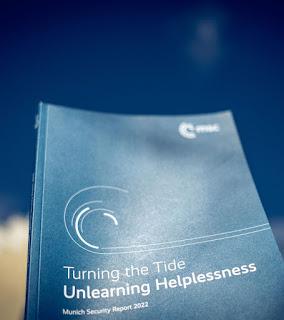The Age of "Collective Helplessness"
We live in a time of existential challenges. The climate breakdown, resource exhaustion and depletion, the strains of overpopulation, the rise of tribalism accompanying the decline of democracy, the list goes on.
Back in my undergrad days I became interested in fatalism, societies that have learned to accept grave perils as inevitable. Back then we thought ourselves masters of the universe, "can do" people. From that perch fatalism seemed incomprehensible, aberrant. A half century later how we have changed.
It's not just individuals or communities that can succumb to fatalism. Nations and communities of nations can exhibit what is called "collective helplessness." It's the subject of this year's Munich Security Conference.
The report describes a mood of "collective helplessness." In the same way as ordinary individuals, whole societies can be overcome by a sense that they simply have no answer to the challenges they face.
"There can be no doubt about it: 2021 could not in any way be characterized as a year of geopolitical optimism. New crises hit the headlines on a more-or-less monthly basis, contributing to the sensation that a growing wave of crises was threatening to overwhelm us," the report reads.
It concludes that this has led to a vulnerability to which liberal democracies are particularly prone. But what makes this mood so perilous is that it brings with it the danger that the world fails to face up to the challenges that it is confronted with, even though the resources, the strategies and instruments required do so are available.
We have the means. We lack the will.
Ulrike Franke is a security expert with the European Council on Foreign Relations (ECFR). She reads the report as an urgent call to the West to do more to come up with solutions to the problems facing the world. According to Franke, the diagnosis of "helplessness" is essentially a continuation of the 2020 MSC report that focused on the notion of "Westlessness," a much-referenced neologism describing a widely shared sense of dismay and disillusionment coupled with an existential restlessness concerning the very viability of the West.

Comments
Post a Comment